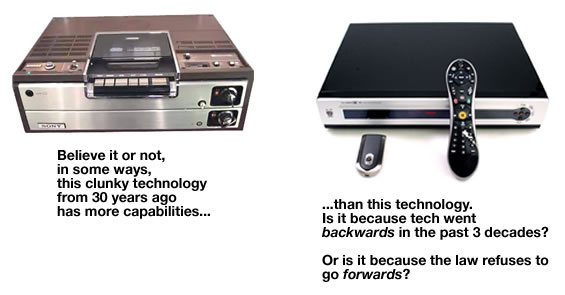The new Canadian copyright bill, Bill C-61, was not written for you and me. Canadians with a stake in this law, ranging from customers (I try not to use the term “consumer”) to libraries and educators to artists, record companies and other entertainment industry groups — were not consulted. Bill C-61 was written to the specifications of U.S. officials and American entertainment industry lobby groups, who pressured the U.S. government of approving the Digital Millennium Copyright Act, a law that has been used by the music and movie industry as an excuse to harass customers and turn litigation into a profit center.
Goodbye Backups, Hello Paying for Multiple Copies

One of the provisions of Bill C-61 is that you are allowed to make a backup copy of a legally-purchased CD or DVD or transfer it to your MP3 player or computer for personal use — if and only if there isn’t a digital “lock” that prevents such backups. If a song or movie has some kind of copy protection scheme, that allowance is gone.
The practical upshot of this is that the watching your DVD of Harold and Kumar Go to White Castle is perfectly legal if you pop it into your DVD player, but illegal if you copy it over to your iPod for viewing on your next business trip. The movie studio would rather you bought another copy, which would only be authorized for play on your iPod. And that mix CD you were planning to make for the car for your roadtrip to the cottage? You’ll be breaking the law for each song that you transfer from copy-protected sources. Want a backup copy of your hi-def The Seven Samurai DVD because you love the film so much and want to keep the original in a safe place? The industry has a simple solution: buy another! Making a backup copy’s illegal, after all.
As we move to systems like iPods and PVRs, the industry is also making moves towards per-device licensing. Their ideal would be for a movie that you purchased via download on your computer be licensed only for that computer; if you want to view it on your Tivo, you’ll have to purchase a copy for your Tivo.
For the entertainment industry, this kind of law is a great deal. They don’t have to do any real work — they can slap any old lame copy-protection scheme on their wares, even ones that have been outmoded. The minute you circumvent that copy protection — which is essentially just a way of squeezing as much money from you as they can — they can use the legal system to squeeze as much money from you as they can.
Goodbye VCR Features

Another provision of Bill C-61 allows you to record television shows on your PVR. That is, if the broadcaster doesn’t disallow recording, which it can do by embedded a “broadcast flag” within the signal — a digital signal that tells your PVR that it’s not allowed to record the show, because that will cut into sales of the DVD box set of the show that they’ll eventually release. In other words, in many cases, your PVR will actually be less capable of recording shows than its clunkier, lower-fidelity predecessor, the VCR.
Here’s another way the VCR has an edge over the modern PVR: with a VCR, you can keep a permanent library of your favourite shows, which will last as long as your tapes do. No such luck with a PVR under Bill C-61: PVRs built in compliance with the bill are not allowed to keep a permanent library of your shows. They will be built with a limited amount of storage and with no backup capability, and just to be safe, all shows recorded on a PVR will be deleted if they are kept for longer than a pre-specified amount of time.
A Betrayal

Simply put, Bill C-61 is a legal stick with which the U.S. entertainment industry can use to beat more money out of us by making us pay for the same thing over and over again. It lets the Canadian government abdicate its responsibility for making laws and hands over that responsibility to American record and movie companies, who will treat it as a profit centre. It is, in the words of Canadian internet/e-commerce law expert Michael Geist, a betrayal.
It is not, in the words of Industry Minister Jim Prentice, a “balanced approach to truly benefit Canadians”.
What You Can Do
I’m borrowing this list from Michael Geist:
- Write to your MP, the Industry Minister, the Canadian Heritage Minister, and the Prime Minister. If you send an email, be sure to print it out and drop a copy in the mail. If you are looking for a sample letter, visit Copyright for Canadians.
- Take 30 minutes from your summer to meet directly with your MP. From late June through much of the summer, your MP will be back in your community attending local events and making themselves available to meet with constituents. Give them a call and ask for a meeting. Every MP in the country should return to Ottawa in the fall having heard from their constituents on this issue.
- If you are not a member of the Fair Copyright for Canada Facebook group, join. If you are, consider joining or starting a local chapter and be sure to educate your friends and colleagues about the issue.
Recommended Reading










